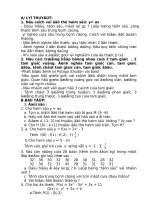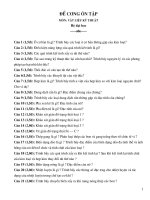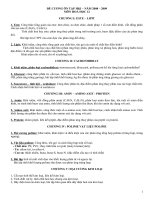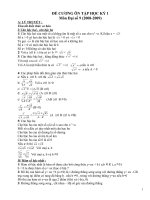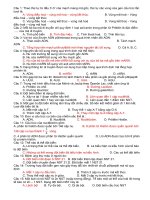DE CUONG ON TAP HKIAV 8
Bạn đang xem bản rút gọn của tài liệu. Xem và tải ngay bản đầy đủ của tài liệu tại đây (190.62 KB, 9 trang )
<span class='text_page_counter'>(1)</span>REVISION –ENGLISH 8 – THE 1ST TERM. A. VOCABULARY and GRAMMAR: (Unit 1 → Unit 8) B. LISTENING: “Listen” in units 1-> 8. GRAMMAR SUMMARY 1/ Present simple tense (thì hieän taïi ñôn): (+). S + V(es/s). (-) S + don’t / doesn’t + V (?) Do / Does + S + V? (Đối với các chủ ngữ: He / She / It / tên riêng + Ves / s (-o, -ch, -sh, -s, -x, -z +ES)) * Dùng để diễn tả: Chân lí, sự thật hiển nhiên, thói quen, hành động thường xuyên xảy ra (Một số trạng từ / cụm từ: always, usually, often, sometimes, seldom, occasionally, rarely, every …, on Mondays / Tuesdays, once a week 2/ The near future tense: (be going to : saép, seõ) (+)S + am / is / are + going to + V(bare-inf) (-) S + am / is / are + not + going to + V(bare-inf) (?) Am / Is / Are + S + going to + V(bare-inf)? . Daáu hieäu: Next, tonight, tomorrow, soon, one day. 3/ The present progressive tense (thì hieän taïi tieáp dieãn): (+)S + am / is / are + V-ing (-) S + am / is / are + not + V-ing. (?) Am / Is / Are + S + V-ing? * Dùng để diễn tả: +Hành động / sự việc đang diễn ra ở hiện tại. Ex: they are watching TV at the moment. + Sự than phiền đi kèm với always Ex: She is always borrowing me money. +Diễn tả tình trạng/hành động mang tính tạm thời (không thường xuyên xảy ra) (Một số trạng từ chỉ thời gian: now, right now, tomorrow, tomorrow morning/ afternoon, evening, , at present, at the moment, this week / month / …, listen!; look!, …) 4/ Present perfect tense (Thì hiện tại hoàn thành): Dấu hiệu: since, for, yet, ever, just,recently Form: + S + have/has + P.P(_ed/d-cột 3) S + haven’t/hasn’t + P.P ? Have/has + S + P.P _he/she/it + has _I/we/you/they + have.
<span class='text_page_counter'>(2)</span> have/has + already/just/ever/never + P.P Ex: They have just received a package from their grandfather. Lien hasn’t prepared her lesson yet. The present perfect with “since” or “for” (sử dụng “since” hay “for” trong thì hiện tại hoàn thành) * SINCE + mốc thời gian since 2000 since last month (year, summer, week…) since March (October, May…) since 2 o’clock since I was young * FOR + khoảng thời gian for 8 years for a month for 3 months for 2 hours for a long time several weeks nearly two years .Supply "for" or "since" in the sentences . 1. Tom's lived here __________ 10 years. 2. Have you waited for me _________ yesterday? 3. The boy has played the game __________ 3 pm. 4. I haven't seen her _________ a month. 5. They have kept in touch __________ they left school. 6. I haven't known about that __________ a long time. 7. Dad's worked this office __________1990 8. Peter has married ___________ half a month 9. We have finished the test __________ three hours. 10. Children have learned English __________ they were young.
<span class='text_page_counter'>(3)</span> 5/ Past simple tense (Thì quá khứ đơn) S + Ved/2 + O S + didn’t + V + O Did + S + V + O? (Tobe: was / were) Ex: I bought this book yesterday morning. * Dùng để diễn tả hành động / sự việc: đã xảy ra và kết thúc tại thời điểm xác định ở quá khứ (Một số trạng từ chỉ thời gian : yesterday ; last night / …, ago) 6/ ENOUGH (đủ … để có thể): Ex: She is old enough to go to school S + be (not) + adj + ENOUGH + (FOR S.O)+ to - V Ex: I have enough money to buy that book. S + V + ENOUGH + N(s) + (FOR S.O)+ to – V NOTES - Enough đứng trước tính từ /trạng từ, đứng sau danh từ - Nếu 2 chủ từ không cùng đối tượng thì phải sử dụng “For Someone” Ex: This suitcase is too heavy for me to carry upstairs. Modal 1: Adj + enough + to-inf 1. He is tall. He can play volley ball.->He is ________________________________________________ 2. Mr. Tam is not rich. He can’t buy a house. ->Mr Tam isn’t________________________________________________ 3. My sister is old. She can go to school. ->My sister is old ……………………………………………………… 4. He is very old. He can stop working. ->_______________________________________________________________________ 5. Tom isn't experienced. He doesn't apply for this job. ->_______________________________________________________________________ 6. We don't have money. We cannot go on a trip. ->_______________________________________________________________________ 7. My sister is old, so she can drive a car. -> _________________________________________________________. 8. The ladder wasn’t very long. It didn’t reach the ceiling. -> _______________________________________________________ 9. The fire isn’t very hot. It won’t boil a kettle. -> _______________________________________________________ 10. Lan isn’t strong. She can’t swim across the river. ->__________________________________________________________ ◦Modal 2: not + adj + enough + to –inf 1. The lady was too old to live there by herself. -> The lady was not _____________________________________ 2. They are too busy to help you. -> They are not ___________________________________________________________ 3. The film was too boring to attract us. -> The film is not _________________________________ 4. Peter is too young to see the horror film. ->Peter is not __________________________________________________________ 5. My sister is too young. She can’t drive a car. ->My sister is not ______________________________________________ 6. She is very short, so she can’t play basketball. -> She is not _______________________________________________________.
<span class='text_page_counter'>(4)</span> 7/ Adverbs of place (trạng từ chỉ nơi chốn): Thường đứng cuối mệnh đề và đứng trước trạng từ chỉ thời gian. (here - ở đây; there - ở kia; outside - ở bên ngoài; inside - ở bên trong; upstairs - ở tầng trên; downstairs - ở tầng dưới; around quanh; out of the window - ở ngoài cửa sổ …) Ex: Come and sit here. 8/ Reflexive pronouns (đại từ phản thân): I myself (chính toâi) You yourselves you yourself it itself he himself we ourselves she herself they themselves. Thường được dùng làm tân ngữ hoặc đứng ngay sau từ được nhấn mạnh.. Ex: He bought himself a new car. 9/ Modal verbs: must / have to / ought to/ should + bare-inf 10/ Why ? (Tại sao……..? ) – Because……………….. ( Bởi vì……………….) E.g: Why were you late for class this morning? Because I went to school on foot. 11/ Prepositions of time (giới từ chỉ thời gian): - IN (trong, vào): Thế kỉ, năm, tháng, mùa, các buổi trong ngày (trừ at night) - ON (vaøo): Caùc ngaøy trong tuaàn, ngaøy thaùng, ngaøy cuï theå (on christmas day; on my birthday) - AT (lúc, vào lúc): giờ, ban đêm, và những dịp lễ (at christmas) - AFTER (sau, sau khi) BEFORE (trước, trước khi) - BETWEEN (giữa hai khoảng thời gian, ngày, năm …) 12/ USED TO (thường, đã từng): diễn tả thói quen trong quá khứ. e.g: - I used to live in HCM city . S + USED TO +bare-inf -I didn’t use to like milk, but now I like it. S + didn’t + USE TO +bare-inf - Did you use to go there ? Did + S + USE TO + bare-inf ? 13/ Adverbs of manner (Trạng từ chỉ thể cách): Cho biết điều gì đó xảy ra hoặc được thực hiện như thế nào? Được thành lập bằng cách: ADJ + ly = ADV ⇒ (S + V + ADV) Ex:. bad badly happy happily Soft softly quick quickly * Một số trường hợp đặc biệt: Good well fast fast Hard hard late late. beautiful beautifully careful carefully early early. 14 Gerunds (danh động từ) = V+ ing: Sau các động từ: like, hate, love, enjoy, avoid, begin, finish, mind , suggest, stop + V-ing. - Danh động từ là một loại từ vừa có tính cách như một động từ vừa có tính cách như một danh từ. 15. Comparison with: a/ Like (gioáng nhau): Like + N / Pronoun: You look like your mother (gioáng) He can like the wind (nhö) S1 Tobe Hình thức so sánh S2 like ( gioáng) A is B similar to ( gioáng) (not) as adjective as ………baèng/ Khoâng baèng.
<span class='text_page_counter'>(5)</span> are. (not) the same as . . . gioáng / khoâng gioáng. different from ( khaùc ) b/ (not) as … as (khoâng / ngang baèng nhau) e.g: - He is as tall as his father. ⇒ S + be+ as + adj + as + N / Pro - Nam speaks English as well as Mary. adv. V. (Theå Khaúng ñònh) - Hoa doesn’t speak French as well as the French. ⇒. be not S + don't doesn't + V didn't. + So / as +. adj + as + N / Pro adv. (Theå phuû ñònh). c/ (not) the same (...) as (sự không đồng nhất) different from (sự khác nhau) e.g: + Her hair isn't the same color as her mother's + She is very different from her sister. + She sings louder than me. 16. Reported Speech a/ Command and requests (caâu meänh leänh, yeâu caàu trong caâu noùi giaùn tieáp): e.g: - “Can you meet me after class?” He asked me to meet him after class. - “Don't open your book, Tom” she said. She told Tom not to open his book. ⇒. S + asked / told + O+ (not) + to-inf.. b/ Advice in reported speech (lời khuyên trong lời nói gián tiếp): e.g: “You should stop smoking” he said. ⇒ He said (that) I should stop smoking. ⇒. S1 + said (that) + S2 + should (not) + bare-inf. 18. In order to – so as to + V(bare-inf) : được dùng để diễn tả mục đích Ex: He’s saving money in order to / so as to go on holiday next summer. Word Forms –English 8 1. extreme(adj) : raát -> extremely(adv) 2. generous(adj) : rộng lượng -> generosity(n) 3. humor(n) : hài hước -> sense of humor : khiếu hài hước -> humorous(adj) : có tính hài hước. 4. lucky(adj) ≠ unlucky (adj) -> luckily(adj) ≠ unluckily(adj) 5. orphan(n) -> orphanage(n). : may maén : khoâng may maén. : treû moà coâi : traïi moà coâi.
<span class='text_page_counter'>(6)</span> 6. social (adj) -> Sociable(Adj) : Cởi mởi 7. Arrange(v) : Sắp xếp -> Arrangement 8. Assist(v) : phụ tá -> Assistant : Người phụ tá 9. Exhibit(V) : Triễn lãm -> Exhibition(n) 10.Commerce(n) : Thương mại -> Commercial(adj) 11.Succeed(v) : Thành công -> Success(n) -> Successful(adj) ≠ unsuccessful -> Successfully # unsuccessfully 12.Deliver(v) : Phân phát -> Delivery 13 . chemistry(n) : Ngành hóa học -> Chemical(adj) : Ngành hóa học 14. Safe(adj) : An toàn -> Safety 15. Destroy(v) : Hủy diệt -> Destruction(n) 16. Electricity(n) : điện -> Electrical (adj) : Thuộc về điện -> Electrical sockets 17. Equip(v) : Trang bị -> Equipment(n) -> Well- equipped(adj) 18. Tradition(n) : Truyền thống ->traditional(adj) -> traditionally(adv) 19.appear(v) : xuaát hieän -> appearance(n) 20.excited(adj) : phấn khởi, hào hứng -> be excited ABOUT something : phấn khởi veà… -> exciting (adj) -> excitement(n) : niềm phấn khởi 21.fool(n) -> foolish(adj). : ngu ngoác. 22.magically (adv). : kì dieäu. 23.fortunate(adj). : may maén. ≠ unfortunate(adj) : baát haïnh, ruûi ro. -> unfortunately(adv). : khoâng may. 24.wise(adj) -> wisdom(n). : khoân ngoan : trí khoân, trí tueä. 25.behave(v) -> behavior(n). : cư xử. 26.improve(v) : caûi tieán -> improvement(n) 27.pronounce(v) : phát âm,đọc -> pronunciation(n) : caùch phaùt aâm 28. to be proud of : tự hào về…. -> pride(n) : nieàm haõnh dieän -> take pride in s.o/ sth 29.revise(v) -> revision(n). : ôn lại, đọc lại. 30.good(adj) -> well(adv). : toát. 31.organize(v) -> organization(n). : tổ chức. 32.young(adj) -> youth(n). : treû : thanh niên. 33.encourage(v) : khuyeán khích -> encouragement(n) 34.voluntary(adj) -> volunteer(n). : tự nguyện : người tình nguyện. 35.apply for -> application(n). : xin vieäc : ñôn xin vieäc. 36.act(v) -> activity(n). : dieãn taäp : hoạt động. 37. excellent(adj) ->excellence(n). : Xuất sắc.
<span class='text_page_counter'>(7)</span> Verb. Volunteer. Annoy Arrange Emigrate. WORD FAMILY CLASS Noun Adjective Luck Lucky ≠ unlucky Extreme Sociability Sociable Generosity Generous Volunteer Voluntary Orphan Orphanage Peace Peaceful Humor Humorous Annoyance Arrangement Emigration. 8 1ST SEMESTER Adverb Meaning Luckily # May mắn unluckily Extremely Cực kỳ Cởi mở Generously Hào phóng Voluntarily Tình nguyện Cô nhi Cô nhi viện Peacefully Yên bình Humorously Vui tính Phiền Sắp xếp Di cư.
<span class='text_page_counter'>(8)</span> Transmit Assist Demonstrate Exhibit Succeed Deliver Serve. Emigrant Transmission Assistance Assistant Demonstration Exhibition Commerce Success. Destroy Injure Cause. Delivery Service Precaution Chemistry Chemist Chemicals Safety Destruction Injury Caution. Electrify. Electricity. Equip. Equipment Tradition Morality Fortune. Improve Pronounce Believe Behave Cooperate Participate Satisfy Sign Revise Enjoy. Fool Excellence Pride Wisdom Improvement Pronunciation Belief Behavior Cooperation Participation Participant Satisfaction Signature Necessity Revision Enjoyment. Người di cư Truyền đi Sự phụ tá Người phụ tá Demonstrative Commercial Successful ≠ unsuccessful. Successfully # unsuccessfully. Phân phát Phục vụ Phòng ngừa Ngành hóa học Nhà hóa hoc Hóc chất An toàn Hủy diệt Bị thương Gây ra , nguyên nhân Thuộc về điện Dẫn điện Thuộc điện tử Trang bị. Precautious Chemical Safe Cautious Electrical Electric Electronic Wellequipped Traditional Moral Fortunate # unfortunate Foolish Excellent Proud Wise. Triễn lãm Thương mại Thành công. Traditionally Morally Fortunately # unfortunately Excellently Proudly. Cooperative Satisfactory. Satisfactorily. Necessary. Necessarily. Truyền thống Đạo đức May mắn # ko may Ngốc Xuất sắc Hãnh diện Khôn ngoan Cải thiện Phát âm Niềm tin Cư xử Hợp tác Tham gia Ng tham gia Hài lòng Ký tên Cần thiết Ôn tập Thích.
<span class='text_page_counter'>(9)</span> Apply Enroll Encourage Explain Establish Differ + from. Application Applicant Enrollment Encouragement Explanation Explanatory Establishment Difference Different Differently Environment Environmental Environmentally. Đơn xin việc Người xin việc Đăng ký ủng hộ Giải thích Thành lập Khác Môi trường.
<span class='text_page_counter'>(10)</span>
